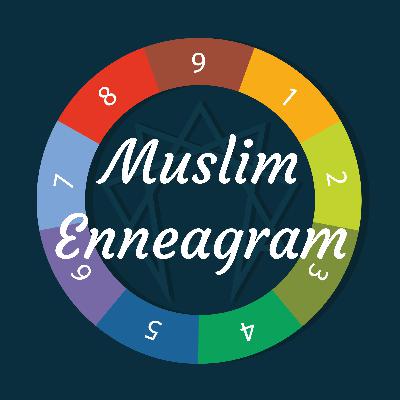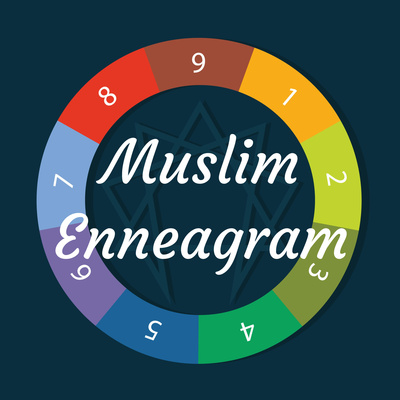Discover Muslim Enneagram
Muslim Enneagram

Muslim Enneagram
Author: Najiba, Rehenuma, and Nada
Subscribed: 18Played: 26Subscribe
Share
© Najiba, Rehenuma, and Nada
Description
Muslim Enneagram is a podcast that explores the Enneagram personality framework and its connections to Islamic spirituality. In Season 1, co-hosts Rehenuma Asmi & Najiba Akbar discuss its history, how they stumbled on it as a personal growth tool, and its roots in Tasawwuf (purification of the self in Islam). In Season 2, they explore each Enneagram type's story and offer insights for growth of each type. In Season 3, they are joined by new co-host Nada Zohdy, and together discuss practical ways they apply self-awareness to enhance many different aspects of their lives as Muslims.
29 Episodes
Reverse
In this episode, Najiba focuses on how the enneagram offers a gateway to presence by showing us clearly what it's opposite looks like - in other words, the conditioned automatic patterns that we fall into when we are asleep to ourselves. Developing the inner observer to "wake up" to our patterns is a key practice that is needed to work with the Enneagram. She also explores the connection to the Islamic concept of muraqqabah, and how this practice of self-observation has been emphasized in the Islamic tradition for centuries. References: Deep Coaching: Using the Enneagram as a Catalyst for Profound Change by Roxanne Howe-Murphyhttps://yaqeeninstitute.org/read/paper/how-to-be-a-mindful-muslim-an-exercise-in-islamic-meditation
In this episode we explore how we can use the wisdom of the enneagram and the spiritual teachings of Islam to successfully navigate times of change in community/team settings and also look at examples from Islamic history that offer inspiration for creating successful group dynamics.
This new season will focus on applications of the enneagram to 3 different areas - working with others in community settings, relationships with friends and family, and our own inner healing work. Join us for fresh new content and an opportunity to dive deeper into the wisdom of the Enneagram.
In this episode, Najiba opens with reflections about how the Enneagram can support our spiritual renewal during Ramadan, then discusses with Nada and Rehenuma how they each try to manage the core vice (“passion”) of their types. Together, they discuss the Enneagram principle of levels of development and its parallel with the Islamic concept of the levels of the nafs (the soul/ego/self). The co-hosts share practical ways they try to check their intentions and strive for higher virtues, and closeness to and contentment from God.
In this episode, we discuss how the enneagram has shaped our lens as parents and how it helps us interact with and support our children's development. When we see the unique perspectives and needs of our kids, we can respond to them with more openness and generosity, and less from a place of fear or needing to control. We also provide some helpful tips for parenting kids of all types.
In this episode, we explore point 5 on the enneagram. We discuss the childhood story and the characteristics of the personality at point 5. We look at how the 5 grows by stretching towards points 8 and 7, how to use the wings for growth, and discuss spiritual practices that can help 5s thrive.
In this episode, we explore point 4 on the enneagram. We discuss the childhood story and the characteristics of the personality at point 4. We look at how the 4 grows by stretching towards points 1 and 2, how to use the wings for growth, and discuss spiritual practices that can help 4s thrive.
In this episode we explore point 2 on the enneagram, and how the story developed at this point is about "giving to get." We discuss the childhood story, the lost part of the self, and the characteristics of the personality at point 2. We also look at the 2’s developmental path on the circle and how we can utilize Islamic spiritual practices and concepts as part of the growth journey.
In this episode we explore point 9 on the enneagram, and how the story developed at this point is about accommodating others as a way to create harmony. We discuss the childhood story, the lost part of the self, and the characteristics of the personality at point 9. We also look at the 9’s developmental path on the circle, the significance of points 3 and 6, and how we can utilize Islamic spiritual practices and concepts as part of the growth journey.
In this episode we explore point 8 on the enneagram, and how the story developed at this point is about prizing strength over vulnerability. We discuss the childhood story, the lost part of the self (called the Soul Child), and the characteristics of the personality at point 8. We also look at the 8’s developmental path on the circle, how to make use of the lines and arrows, and how we can utilize Islamic spiritual practices and concepts as part of the growth journey.
In this episode we explore the three types in the head center, and how they each relate to the core emotion of fear and the search for security. We will look at how each type builds a strategy around this search, as a way to defend against fear. We also take a look at the stories of Imam al Ghazali, Ali ibn Abi Talib (r.a.), and Ibn Batuta and how their life stories reflect some of the characteristics of the head types.
In this episode we explore the three types in the heart center, and how they each relate to the core emotion of shame and the search for worthiness. We will look at how each type builds a strategy around this search, as a way to defend against the emotion of shame. We also take a look at the stories of Khadija, Ayesha, and Fatima - three blessed women who lived alongside the Prophet Muhammad and discuss how their stories reflect aspects of the heart center's key storylines.
In this episode we look at the Intuitive or "Body" Center of the Enneagram, which includes types 8, 9, and 1. We discuss why it is important to recognize the different centers of intelligence and how they types in this center relate to the core emotion of anger. We will also discuss examples of these types in Islamic history, and look at spiritual practices that relate to this center.
In this episode we will take a closer look at the origins of the enneagram and its relationship to Islamic concepts of the purification of the nafs (soul) and the spiritual journey towards God. The enneagram serves as a mirror for us to recognize our state, so that we can begin the work of polishing our hearts from a more honest place.
Join us for our first episode where we talk about how we became enneagram enthusiasts, and what brought us together to start this podcast. We discuss our own entry points into this topic, and how discovering our enneagram type opened up a new lens for us to understand ourselves and others.
Learning to tune into our bodies is a crucial part of the healing journey. When we are able to develop and fine tune the felt sense, we gain access to a world of information and awareness that we may have previously ignored. In this episode we explore what the felt sense is and how to develop it, drawing on the work of Eugene Gendlin and Marion Gilbert.Resources:Focusing, by Eugene GendlinWaking the Tiger, by Peter LevineSomatic Enneagram: www.mariongilbert.com
In this episode, Najiba speaks about the importance of including heart-based work in our healing journey. This is done by getting in touch with our heart center and contacting our deeper feelings and wounds. Various practices for connecting with our hearts are discussed, including inner child work, nature and sound therapy, and learning how to name and be with our emotions.Resources:Healing the Child Within by Charles WhitfieldInner Bonding by Margaret PaulFeelings Buried Alive Never Die by Karol TrumanSelf-Compassion by Kristin Neff
In this episode, Najiba and Rehenuma discuss the inner critic and how to work with it to foster self-compassion and a greater sense of ease within ourselves. We discuss the three stages of the nafs described in the Quran, and then take a deep dive into contemporary approaches to working with the inner critic, which serves as the mouthpiece of our ego. We touch on various approaches to name and tame the critic, from Voice Dialogue to Internal Family Systems. This episode also includes a sample dialogue practice that can be done with a partner.References:https://www.isip.foundation/soul-islamic-psychology/No Bad Parts: Healing Trauma and Restoring Wholeness with the Internal Family Systems Model – Richard C. Schwartz (2021)Your Resonant Self: Guided Meditations and Exercises to Engage Your Brain’s Capacity for Healing – Sarah Peyton (2017)Embracing Your Inner Critic: Turning Self-Criticism into a Powerful Ally – Hal Stone & Sidra Stone (1993)Additional Resources:Freedom from Your Inner Critic: A Self-Therapy Approach – Jay Earley & Bonnie WeissHomecoming: Reclaiming and Healing Your Inner Child – John Bradshaw (1990)
This Ramadan special episode has a different format from our usual conversational approach, with each co-host presenting a brief segment related to the three mini-series topics we will explore throughout season four. Nada reflects on how we can mindfully meet our social needs this month, while balancing that need for connection with the importance of stillness and solitude. Najiba invites listeners to embark on a path toward greater presence this Ramadan, through accepting the natural gifts that come through our type and reflecting on Allah's attributes. Rehenuma reflects on our relationship to the Qur’an, our communities and our Creator, so that we can connect to them meaningfully through our head, body and heart.
In this episode we talk about the enneagram's harmonic triads, and how each type brings a different strategy to conflict situations. We also look at examples from the Quran and sunnah of conflict and connection and talk about the importance of working through challenges and seeking support from others.






